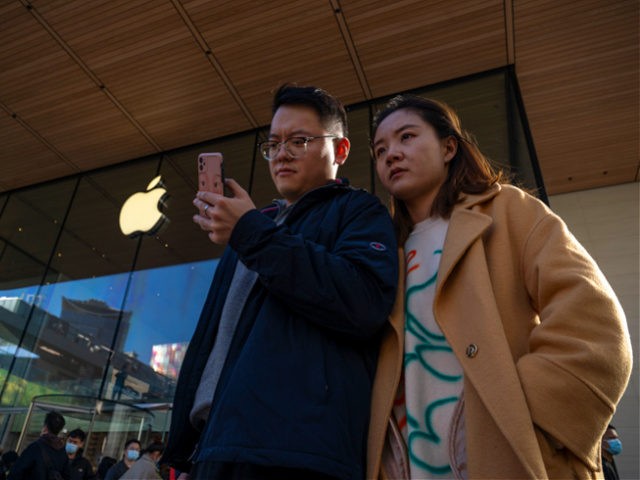Makers of apps that allow users to read and listen to the Bible and Quran, including Amazon’s Audible, announced Friday they had removed such apps from China’s Apple Store citing Chinese government “permit requirements.”
A Bible app developer based in Spokane, Washington, named Olive Tree Bible Software said it removed its app from China’s Apple store “after learning from Apple’s App Store review process that it needed special permission to distribute an app with ‘book or magazine content,'” the Associated Press (AP) reported on October 16.
Olive Tree Bible Software said it is currently reviewing the steps it must take to obtain the newly required permit “with the hope that we can restore our app to China’s App Store and continue to distribute the Bible worldwide.”

A Chinese customer looks at a phone at the official opening of the new Apple Store in the Sanlitun shopping area on July 17, 2020, in Beijing, China. (Photo by Kevin Frayer/Getty Images)
A company called Pakistan Data Management Services, which makes a Quran-reading app, said Friday it is “looking to figure out what documentation is needed to get approval from Chinese authorities so the app can be restored.”
The Karachi-based company referred to its “Quran Majid” app, which has nearly one million users in China and roughly 40 million globally.
“Those who had already downloaded the app can still use it,” Hasan Shafiq Ahmed, the company’s head of growth and relationships, told the AP on October 16.
Audible, Amazon’s audiobook service, which is a more fully developed app compared to the Bible and Quran-specific apps, was also affected by China’s new Internet regulations over the weekend.
“What appears to link Audible with the religious apps is that all were recently notified of permit requirements for published content,” the Times of Israel noted Friday.
“The removals were first detected this week by watchdog website AppleCensorship, which monitors Apple’s app store to detect when apps have been blocked,” according to the AP.
Liu Pengyu, a spokesman for China’s embassy in the U.S., declined to speak to the AP “about specific app removals” on October 16 when the U.S.-based news agency asked him about the incident, Voice of America relayed.

A Bible is seen after an underground church Christmas Eve service at an apartment in Beijing on December 24, 2014. (AFP PHOTO/GREG BAKER)
Liu did tell the AP that the Chinese government has “always encouraged and supported the development of the Internet.”
“At the same time, the development of the Internet in China must also comply with Chinese laws and regulations,” he said in an emailed statement.
The U.S.-based multinational tech corporation Microsoft announced on October 14 plans to shutter its main LinkedIn service in China by the end of 2021.
The employment-oriented website said it was “facing a significantly more challenging operating environment and greater compliance requirements in China.”
“Given this, we’ve made the decision to sunset the current localized version of LinkedIn, which is how people in China access LinkedIn’s global social media platform, later this year,” the company wrote in a blog post.
“Unlike LinkedIn, which has been offering a specialized Chinese service since 2014, Amazon-owned Audible said it does not have a dedicated service for customers in China,” the Times of Israel observed on October 16.

COMMENTS
Please let us know if you're having issues with commenting.